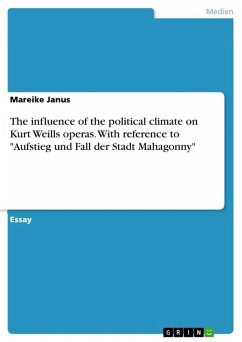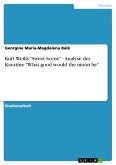Essay aus dem Jahr 2004 im Fachbereich Musik - Sonstiges, Note: 2, University of Nottingham, Sprache: Deutsch, Abstract: In order to illuminate the political and social circumstances and influences under which the opera "Aufstieg und Fall der Stadt Mahagonny" was created, it is crucial to outline the political climate in the 1920s in Germany first. Subsequently, the reader will learn more about the authors, Kurt Weill and his librettist Bertolt Brecht, the latter being of crucial importance to the political statement of the Mahagonny-opera. Finally, the consequences which Weill and Brecht draw from the political climate for the genesis of their works will be elucidated. Kurt Weill collaboration with the poet Bertolt Brecht is restricted to the years 1927 to 1931, when the Weimar Republic reached the high point of its "golden years" before in 1933, Hitler took over power in Germany. After the Second World War, Germany experienced its first democratic republic that brought a new liberty of opinion with it. During the era under Kaiser Wilhelm, there had been little scope for artistic and intellectual forces, but with the new democratic freedom the arts flourished throughout the time of the Weimar Republic. Most of all, the 1920s in Germany were a time of uncertainty and political insecurity, on the one hand, coming from outside Germany, like the Contract of Versailles which made Germany give away all colonies and huge sums of money to the allies. This lead to an inflation which reached its peak in 1923 before the vicious circle was stopped with the help of a monetary reform and loan from foreign countries, especially from the USA. The loans were to contribute strongly to Germanys undoing in a few years later when America pulled back its credits itself being in a desolate state due to the world economic crisis. However, the new Reichskanzler Stresemann, voted in 1923, managed an economical upswing, which would later be referred to as the "golden twenties" with regard to the growth in technology and industry. But on the other hand, Germany was also shaken from the inside at that time: revolts, political murders, attempts of coup d'état and insurrections mirrored the discontent and the disagreement of the German people. The Black Friday and the stock marked crash in 1929 finally led to the economical downfall of Germany connected with poverty and a high unemployment rate - for the second time in just a few years, the country went into an economical chaos. This prompted the strong popularity of the extreme political parties at the beginnings of the 1930s.
Dieser Download kann aus rechtlichen Gründen nur mit Rechnungsadresse in A, B, BG, CY, CZ, D, DK, EW, E, FIN, F, GR, HR, H, IRL, I, LT, L, LR, M, NL, PL, P, R, S, SLO, SK ausgeliefert werden.









